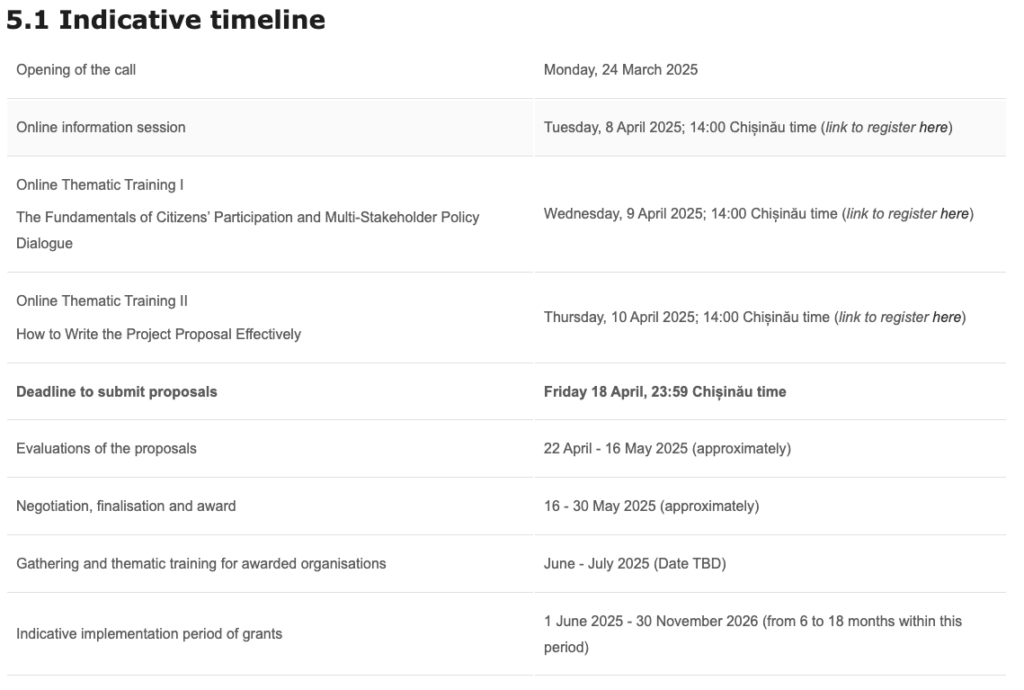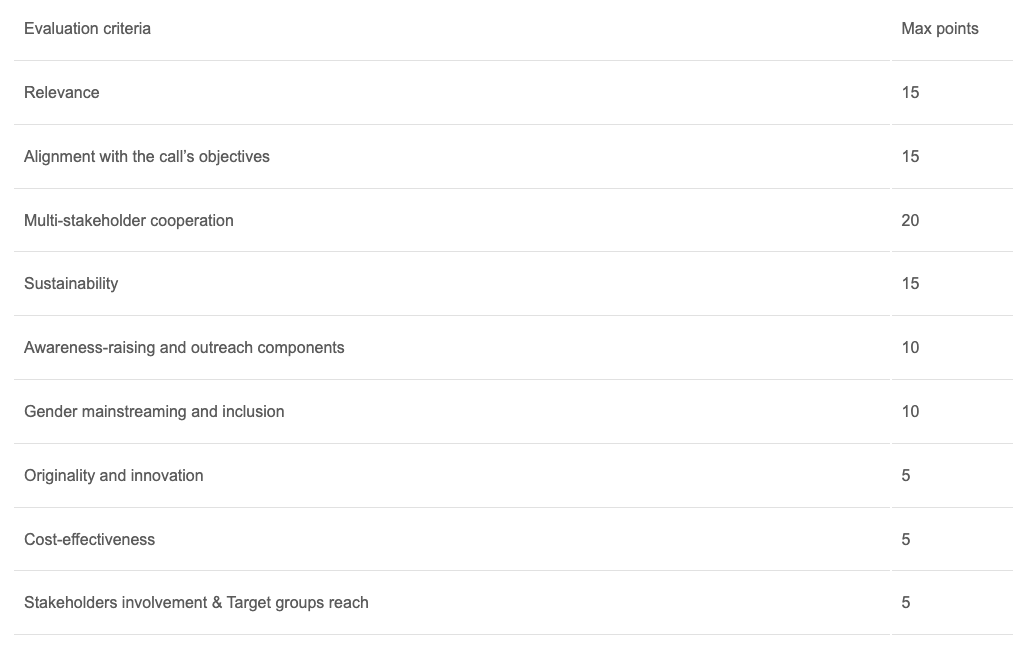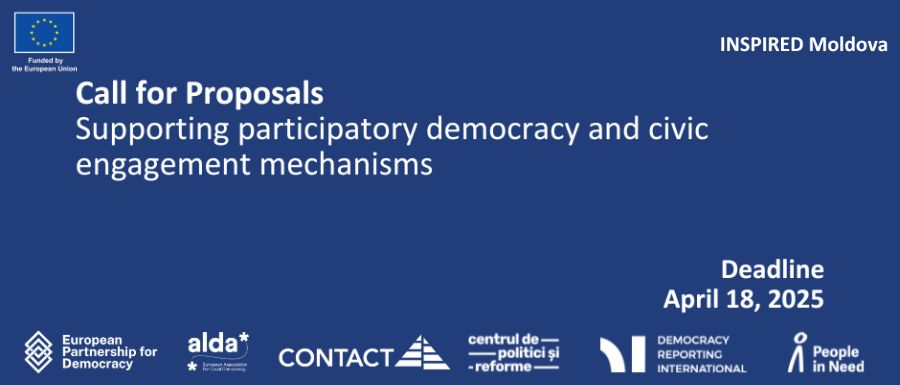Objectives of the call for proposals
The overall objective of this call for proposals is to provide technical and financial support for joint cooperation initiatives between CSOs and public authorities and civic engagement activities.
The specific objectives of this call for proposal are:
- To empower CSOs as key intermediaries to mobilise citizens and ensure their voices are reflected in policy decisions at local and regional levels.
- To strengthen consultation mechanisms by supporting CSOs in creating or enhancing platforms that facilitate dialogue between public authorities and communities.
- To enhance participatory governance by fostering collaboration between CSOs and authorities to improve policy implementation, inclusion, and responsiveness.
- To promote citizen engagement and civic education through participatory budgeting initiatives, policy monitoring and evaluation, and awareness-raising activities that increase transparency, accountability, and informed public participation.
Scope of the support programme
Financial support
Selected organisations will receive financial support in the form of grants managed by the European Association for Local Democracy (ALDA) and People in Need Moldova (PIN). This funding will enable the successful applicants to cover project-related expenses, facilitating the implementation of their activities and achieving the objectives outlined in their proposals.
Technical support
In addition to financial support, selected organisations will benefit from customised, needs-based consultancy services provided by the CONTACT Centre. This will include on-demand assistance in organisational development and other key areas to strengthen their operational capacity.
Furthermore, thematic capacity-building training will be offered to prepare project implementers to engage effectively in democratic processes, promoting active citizen participation, and engaging meaningfully in policy dialogue.
Granting modalities
The grants’ duration will range from 6 to 18 months, depending on its size, scope and objectives. It is set to begin in June 2025 and must be completed no later than November 2026.
The grant recipient will sign a grant contract agreement with ALDA or PIN, as grant intermediaries of European Union funding. Several proposals are expected to be funded under this call, divided under three streams:
- Lot 1: Consultation mechanisms at the national, district level or in several municipalities. These grants will support the development and strengthening of consultation platforms (for example, such as District Participatory Councils, Transparency Councils, etc), as well as the work of advocacy coalitions to enhance civic engagement in policy implementation within specific sectoral policies (for example, the implementation of social policies, environmental policies, development plans, etc). The amount available for these grants can be up to EUR 30,000.
- Lot 2: Consultation mechanisms for communes and villages. These initiatives should help foster inclusive decision-making at the local level by ensuring that community voices are actively represented in governance processes, aiming at reinforcing existing participatory platforms or at establishing new ones. The amount available for these grants can be up to EUR 16,000.
- Lot 3: Grassroots participation initiatives at the commune and village level. These grants enable CSOs to promote active citizen engagement, implement participatory budgeting initiatives, and develop local engagement strategies that integrate communities into governance structures and policy dialogues. The amount available for these grants can be up to EUR 12,000.
Selected organisations will be exempted from VAT from the costs incurred within this grant; therefore, the budget proposal should contain the planned costs excluding VAT.
Eligible activities and priorities of the call
The following types of activities are eligible for funding. The list is neither exhaustive nor cumulative. Additional types of activities may be considered, provided they align with the objectives of this call for proposals. These examples are offered as suggestions to inspire potential applicants and guide their project design.
Civic education and citizens’ engagement in democratic processes
- Conducting awareness campaigns to promote democratic governance and support democratic processes in order to increase civic and democratic culture at the local level, focusing on civic and voter education, active participation and inclusion;
- Organising training sessions and workshops on civic education, media literacy and community mobilisation and organisation to encourage informed and active participation in democratic processes;
- Facilitating citizen forums, debates, town hall meetings, and policy discussions to encourage dialogue with local authorities and involve citizens in the public consultation process and decision-making, especially for groups that are less represented;
- Promoting civic responsibility through awareness campaigns and media outreach, including through community events, digital campaign and direct engagement with citizens;
Partnerships for participatory policy-making
- Creating or strengthening multi-stakeholder consultation platforms and other participatory mechanisms involving public authorities to develop sustainable partnerships among community actors and to involve them in solving community problems;
- Structured consultations between CSOs, local authorities, and community representatives to increase awareness on their role in local policy-making;
- Public hearings and roundtables to gather citizen input on local policies and initiatives by organising sessions of policy dialogue through budget hearings, participatory budget-making, and social audits with public authorities;
- Mechanisms for feedback collection and response to ensure that authorities act on citizen concerns across the policy and budget cycle (from design to monitoring and evaluation) through joint reflection and coordination meetings with public authorities (central or local) to improve their responsiveness and the quality of citizen involvement in public policymaking;
Transparency and inclusiveness
- Participatory initiatives allowing citizens to propose and vote on local spending priorities through the development of tools that enhance the participation of civil society in budget-making processes at the local level;
- Citizen monitoring mechanisms for democratic and governance processes and budget allocation through the conduction of social audits, public budget hearings, or public consultations, prioritising budgetary processes that relate to policy priorities such as gender, environment, and climate change;
- Community-led development initiatives that reflect the needs of diverse social groups by promoting the needs and rights of the most vulnerable groups towards the public authorities to include specific and targeted provisions responding to their needs.
The cross-cutting priorities of this call are to strengthen civil society’s ability to protect democratic spaces by fostering citizen engagement and collaboration with public authorities. Additionally, it aims to promote informed decision-making in response to the growing spread of disinformation concerning public affairs and democratic processes. The key elements outlined below should be considered while preparing the application:
- Proposals featuring public awareness initiatives on disinformation risks, digital and media literacy, and electoral integrity will be highly valued, particularly in the early project stages. However, no activities should take place immediately before or on election day.
- Proposals that foster structured and sustained cooperation with public institutions (local public authorities, ministries and decentralised agencies or agencies in relevant sectors, etc) while promoting inclusive participation of citizens in decision-making will be considered highly relevant.
- Given the importance of cooperation between civil society and public authorities to develop effective and sustainable cooperation initiatives with public authorities, prospective applicants are encouraged to work closely with public authorities and coordinate with them while preparing their proposal.
- Complementarity and synergy with ongoing initiatives, advocacy coalitions, networks, platforms and existing permanent consultation mechanisms are strongly encouraged to ensure a coordinated, sustainable, and high-impact approach to strengthening democratic governance.
- Promoting gender-responsive, socially inclusive and environment friendly approaches into policy-making is a high priority.
The following types of activities are ineligible for funding: actions that focus primarily on individual sponsorships for participation in workshops, seminars, conferences, or congresses will not be supported. Additionally, activities concerned mainly with individual scholarships for studies or training courses are excluded. Any actions that support political parties and/or individual politicians are also ineligible.. Furthermore, retroactive financing for projects that are already in progress or have been completed will not be considered. Projects that provide exclusive benefits to individuals or restricted groups of individuals will not qualify for funding. Actions within the formal education sector will generally be ineligible, except in special circumstances. Environmentally harmful projects will not receive funding, and the purchase of equipment is only permissible if it is directly linked to the implementation of the project.
A prospective applicant organisation may submit only one application for the entire call for proposals, rather than one per lot. Applications must be submitted by individual organisations, not as part of a consortium. However, collaboration and synergies between project proposals are strongly encouraged. Allocating a small part of the budget for digitization of organizations (e.g. cybersecurity software, subscription to the communication platform, etc.) is encouraged.
Application and selection process
The following provides an overview of the application and selection process from the publication of the guidelines to the start of implementation.

Full application submission
The application period is open immediately and will close on Friday 18 April 2025; 23:59 Chișinău time. The full application package is composed of:
- The full application form filled in an editable document (Annex 1)
- The Mandate and Statement on exclusion criteria both signed (Annex 2)
- The budget application form filled (Annex 3);
- The identification / registration certificate of the applicant.
Applications should be sent to inspiredmoldova@gmail.com; Applications must be submitted in Romanian, Russian or English languages.
Evaluation and award procedure
Administrative compliance
All applications will undergo an administrative check that establishes whether the information required by the online application form has been provided. Applications will be assessed through the administrative compliance criteria described below:
- The application package is received complete, in line with section 5.2 above.
- The organisation must be an NGO registered in Moldova and provide a certificate of registration.
- The organisation must be able to sign a grant agreement with PIN or ALDA.
- The organisation is not already a beneficiary of a grant within the INSPIRED Moldova project.
- The organisation declared not meeting any of the exclusion criteria outlined in the Annex 2 – Mandate & Statement on exclusion criteria.
Technical evaluation
The Evaluation Committee will then assess the administratively compliant applications against the criteria listed below:

Final evaluation & award decision
Based on this evaluation, applicants will receive an official response with the outcome of their application. If selected for funding, a number of additional documents may have to be completed by the applicant as part of the due diligence process. Once all comments have been addressed and additional information and documents have been provided, a grant agreement will be signed between the applicant and People in Need or ALDA.
Funded by the European Union, the INSPIRED Moldova project is implemented by a distinguished consortium, including the European Partnership for Democracy (EPD), ALDA, the National Center for Assistance and Information of NGOs in Moldova CONTACT, the Center for Policy and Reform (CPR Moldova), Democracy Reporting International (DRI), and People in Need (PIN). As these activities unfold, INSPIRED Moldova continues to drive meaningful change, ensuring that young people remain at the forefront of shaping the country’s democratic future.
Full Call for Proposals – English Version here & Romanian version here.

